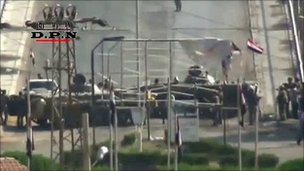 The Syrian army is shelling the eastern city of Deir al-Zour for a second day, reports say, as regional pressure mounts on President Bashar al-Assad.
The Syrian army is shelling the eastern city of Deir al-Zour for a second day, reports say, as regional pressure mounts on President Bashar al-Assad.
Activists and residents said explosions and gunfire resumed early on Monday, and that troops backed by tanks had re-entered the city's eastern side.
At least 50 people died on Sunday after the army launched a pre-dawn assault.
Meanwhile, Saudi Arabia's King Abdullah said the violence against civilian protesters in Syria was unacceptable.
He said the Mr Assad's government had to implement real reforms and stop what he called the "death machine" before it was too late.
Turkey and the Arab League earlier made similar appeals.
Human rights activists say at least 1,700 civilians have been killed and tens of thousands arrested since the uprising began in mid-March. More than 300 people are believed to have died in the past week alone.
'Protecting citizens'
On Monday, the Local Co-ordination Committees, an activist group that documents and organises protests, said machine-gun and artillery fire could once again be heard in Deir al-Zour.
Mohammed, a resident, told the Reuters news agency that armoured vehicles were shelling the al-Hawiqa district heavily with 76mm (3in) guns.
The al-Joura district, which straddles the Euphrates river, was also hit hard and thousands of residents of both areas had fled, he said.
"Private hospitals are closed and people are afraid to send the wounded to state facilities because they are infested with secret police," he added.
One activist told the AFP news agency: "The army opened fire with heavy machineguns on al-Joura. Security forces then launched a search sweep, terrorising residents."
The London-based Syrian Observatory for Human Rights meanwhile cited residents as saying security forces had shot dead a mother and her two children as they tried to escape al-Hawiqa by car.
The assault on Deir al-Zour, about 450km (280 miles) east of Damascus, began during the dawn call to prayer on Sunday, with scores of tanks and armoured personnel carriers moving into several parts of the city.
State media said local leaders had called on the army to "protect the citizens and preserve public and private property".
Troops armed with heavy weapons and backed by tanks also stormed the restive town of Maarat al-Numan, in the northern province of Idlib, at dawn on Monday, the Local Co-ordination Committees said.
"Forces entered the city from its eastern side and they are preventing the residents from entering or leaving the city."
In many other parts of the country, protesters staged impromptu overnight rallies against the regime.
Access to Syria has been severely restricted for international journalists and it is rarely possible to verify accounts by witnesses and activists.
'Enact reforms'
In a major escalation of international pressure on President Assad to halt the deadly crackdown on dissent, King Abdullah announced that his country had recalled its ambassador to Damascus for consultations.
"What is happening in Syria is not acceptable for Saudi Arabia," he said in a statement read out on the Saudi-owned satellite channel, al-Arabiya TV. "There are only two options for Syria's future: either it chooses wisdom on its own, or it will be pulled down into the depths of chaos and loss.
"The kingdom of Saudi Arabia... demands an end to the killing machine and bloodshed and calls for acts of wisdom before it is too late.
"Syria should think wisely before it is too late and issue and enact reforms that are not merely promises but actual reforms," he added.
The BBC's Jim Muir in Beirut says that by Arab diplomatic standards, it was a highly dramatic intervention by the Saudi monarch.
It is by far the clearest and toughest regional position Syria has met, and it comes from one of the most influential Arab powers, he adds.
On Monday, the foreign minister of Kuwait said it was also recalling its ambassador to Syria. Sheikh Mohammed al-Sabah said the foreign ministers of Gulf states would meet soon to discuss the situation.
The Arab League also issued a statement on Syria for the first time on Sunday. It said it was "alarmed" and called for an end to the violence.
Another major force in the region, Turkey, is stepping up the pressure too, our correspondent adds. Its Foreign Minister, Ahmet Davutoglu, is due in Damascus on Tuesday with a "tough" message for Mr Assad.
Damascus has said its critics are ignoring the killings and destruction by "armed terrorist gangs", and also ignoring the reform programme that the president has launched in a bid to defuse the crisis.



